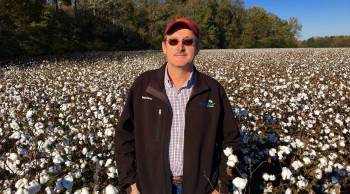Cotton subsidies hamper trade relations
Share Now on:
Cotton subsidies hamper trade relations
KAI RYSSDAL: Tomorrow in Washington American trade officials will be talking cotton subsidies with some African counterparts. Specifically, they’ll be defending U.S. cotton subsidies. The World Trade Organization outlawed those kinds of payments to growers two years ago. But American farmers are still getting government checks. And they’re a major reason wider trade talks between the U.S. and Africa have cooled. Gretchen Wilson reports from South Africa.
GRETCHEN WILSON: In a dark corner of Johannesburg’s Rosebank Market, amid the local musicians and informal vendors, Thobeka Koyana makes her living selling traditional clothing.
THOBEKA KOYANA:“I’m from Xhosaland, so I’m using cotton they call ‘umpaxho’ in Xhosa. That’s the cotton I use most of my clothes.”
As she adjusts garments on her mannequins, Koyana says most clients make a point to demand local cotton, which they call “real” cotton.
KOYANA:“Cotton is very important to people. That’s the first word coming out of a customer. They will ask: ‘Is this a real cotton?'”
That real cotton also supports the more than 10 million Africans who rely on it as a cash crop. Yet in an irony common in the global age, imported cotton is cheaper than local cotton. A lot of it’s from the U.S., the world’s leading cotton exporter. The U.S. spends $4 billion a year to subsidize its own cotton industry, creating more supply than the global market demands. It’s driven cotton prices down 50 percent since the mid-1990s.
That’s why trade representatives from Benin, Burkina Faso, Chad and Mali — also known as the Cotton Four — are eager to meet with US officials.
Philip Alves is an economist at the South African Institute of International Affairs. He explains why African farmers say they can’t compete:
PHILLIP ALVES:“The subsidies that Washington pays to cotton farmers in the United States materially affects their ability to sell their produce on world markets. Because internal domestic markets in Africa are so small and fragmented, world markets is all these producers have.”
U.S. farmers say that’s all they have, too. They say that while they do get subsidies, their costs are much higher than other countries. They won’t agree to lower subsidies unless a trade deal compensates them with better access to new markets. US politicians are unlikely to eliminate subsidies in next year’s farm bill, in part because it would cause a major backlash from voters.
But the international backlash is already happening. Months after the collapse of the Doha round of talks, the world’s poorest countries are rallying behind the Cotton Four.
ALVES: It’s so heavily supported because it’s symbolic of everything this round is supposed to be trying to achieve, which is, in very simple terms: rich countries protecting their farmers less, to the benefit of poor farmers in other parts of the world.
U.S. officials want to liberalize trade. Experts say today’s meeting is largely ceremonial, but it will take meetings like this to get trade talks back on track.
In Johannesburg, I’m Gretchen Wilson for Marketplace.
There’s a lot happening in the world. Through it all, Marketplace is here for you.
You rely on Marketplace to break down the world’s events and tell you how it affects you in a fact-based, approachable way. We rely on your financial support to keep making that possible.
Your donation today powers the independent journalism that you rely on. For just $5/month, you can help sustain Marketplace so we can keep reporting on the things that matter to you.


















